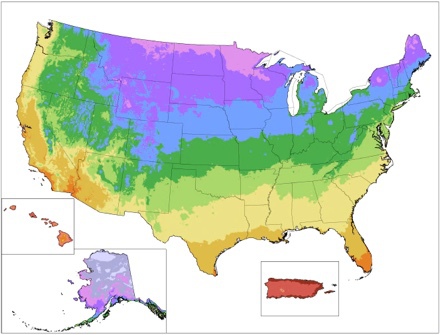Product Details
Highlights
Echeveria 'Lilac Frost' (O'Connell): Giant rosette with astounding, bumpy texture on nearly the whole leaf surface when mature. It can grow to 12.0" and then grows tall on its stem. It has very distinctive coloring of mint green, frosted with a lavender wash that changes through the seasons. Keep in bright sun to see the full expression of the leaf colors. The leaves are covered with a powdery coating of natural wax (farina). Older, outer leaves will turn a dusty rose color. This cultivar is a hybrid of E. 'Etna'.
Echeveria need bright sunlight to maintain their colors and compact rosette form. They will not survive a hard frost, but if there is a risk of freezing temperatures they can be brought indoors to grow on a sunny window sill or under a grow light.
Like most succulents, they need great drainage and infrequent water to prevent rot. Pick containers with drainage holes and use well-draining cactus and succulent soil with 50% to 70% mineral grit such as coarse sand, pumice, or perlite. Water deeply enough for water to run out the drainage hole, then wait for the soil to fully dry before watering again.
Also known as "Mexican Hens & Chicks", Echeveria can produce new offsets or "chicks" around the base of the mother plant. These chicks can be left to form a tidy cluster or removed and transplanted. Additionally, Echeveria can be propagated from stem cuttings or mature leaves. Look to our Succulent Cuttings Guide for more information.
Product Size
2.0" Pot
Current Primary Color
Purple / Black
All Seasonal Colors
Blue / Blue-green
All Seasonal Colors
Pink
Bloom Color
Pink Bloom
Grow Zone (Hardiness)
Zone 10 (30F)
Recommended Light Conditions
Bright Indoor Light
Recommended Light Conditions
Filtered / Partial Sun
Maximum Height
9"-12"
Maximum Rosette Size
Over 8"
Growth Habit / Shape
Rosette
Seasonality
Year-round Color
Special Characteristic
Easy to Propagate
Special Characteristic
Pet Safe

THIS PLANT IS HARDY IN ZONES 10+
WHAT IS MY HARDINESS ZONE?
Videos
Echeveria soft succulents, sometimes known as Mexican Hens and...
















